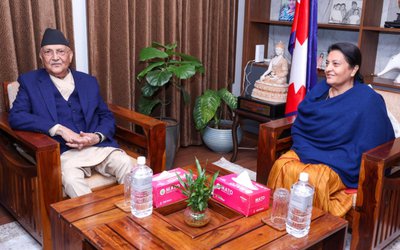As regional diplomatic tectonic plates shift with the rise of two Asian powers, India and China, the environment in South Asia has changed a lot. High economic growth is greeting little unknown places. Despite this conducive environment for economic progress, Nepal has been unable to take any concessions from these neighbors in investment and trade.
Although prime minister Pushpa Kamal Dahal Prachanda declared that Nepal wanted to be a dynamic bridge between India and China, the response from the neighbors is rather chilly.
With little capacity for diplomatic maneuvering, Prime Minister Prachanda’s act to balance both the neighbors did not materialize, nor did it pay any dividend to Nepal at all. In the name of balancing the two neighbors, Nepal has lost its own balance and its own trustworthiness of being between the two giants.
Prime Minister Prachanda, who met Indian Prime Minister Narendra Modi and Chinese president Xi Jingping on the sidelines of Brics summit in Goa, discussing various bilateral and regional matters, was unable to gain the confidence like Bangladesh.
Prachanda’s emphasis on the need for trilateral strategic partnership among Nepal, India and China came up in the wrong time. “Nepal wants to reap benefits by working as a dynamic bridge between the two countries,” said Prachanda.
As India and China’s relations are at the lowest regarding issues of Pakistan, Prime Minister Prachanda’s call for trilateral cooperation went in vain. While meeting with Prime Minister Prachanda, Indian Prime Minister Modi stressed the need to fulfill his commitment to reform the constitution to settle the internal political disputes.
Chinese president Xi does have his own concerns.
Although the Prime Minister’s office released a photograph of the three leaders sitting together in the waiting lounge of the resort and claimed Prachanda proposed trilateral cooperation with India and China, India’s Ministry of External Affairs described the meeting as purely coincidental.
"It was just entirely coincidental that in the leaders' lounge, all three were present at the same time. The bilateral meeting between Nepal and China had already ended, so I don't know on what basis people are calling it a trilateral and all that. It is perfectly normal in a multilateral setting for leaders to be together in a lounge on the sidelines somewhere else. So I don't think you need to read too much into that," MEA spokesperson Vikas Swarup said.
That Prachanda had officially proposed trilateral cooperation was revealed in a statement by his secretariat in Kathmandu. “During the 'trilateral meeting', Prime Minister Prachanda reminded that during his previous tenure he had emphasized on the need for trilateral strategic partnership among Nepal, India and China,” said a statement by the Nepalese PMO.
"Nepal lies between two giant neighbors — India and China. We wish to reap benefits of this geographical specialty by working as a dynamic bridge between the two countries," Prachanda said, according to the statement.
However, India and China issued no statement officially to justify Prachanda’s claims.
According to a press release issued by Chinese Foreign Ministry following the meeting, it said that president Xi Jinping pointed out that China and Nepal are close neighbors linked by mountains and rivers. Since the two countries established diplomatic relations more than half a century ago, China-Nepal relations have withstood the vicissitudes of the international situation and always maintained sound and stable development.
Xi Jinping stressed that China and Nepal should strengthen high-level contacts and political communication, continue to render mutual support on issues involving each other's core interests and major concerns, carry out the consensus the two countries have reached on beefing up cooperation in such areas as connectivity, free trade arrangement and energy, and continue efforts in pushing forward cooperation in pursuit of development.
“Both sides should launch more extensive people-to-people and cultural exchanges, increase exchanges and cooperation in such areas as tourism, education, culture, youth, media and local affairs, and keep coordination and cooperation within such frameworks as the United Nations, the Shanghai Cooperation Organization and the South Asian Association for Regional Cooperation," said Chinese President Xi.
Prime Minister Pushpa Kamal Dahal expressed that the time-honored Nepal-China friendship is unbreakable. Established on the basis of the Five Principles of Peaceful Coexistence, Nepal-China relationship features mutual respect and trust.
On President Xi Jinping's meeting with Nepali Prime Minister Prachanda and Indian Prime Minister Modi on trilateral cooperation, Chinese Foreign Ministry Spokesperson Hua Chunying's said, “Nepal and India are China’s friendly neighbors. We believe that positive interactions of the three pairs of bilateral relations will not only promote economic and social development of the three countries, but also contribute to regional stability and development. We would like to explore how to enhance trilateral cooperation with India and Nepal so as to advance common development of the three countries,” said spokesperson.
As both the neighbors interpreted Nepal’s claim in their own ways, avoiding their views, Prime Minister Prachanda’s claim went unsusbstantiated. His efforts to play between the two regional powers made him irrelevant.

Keshab Poudel
Poudel is the editor of New Spotlight Magazine.
- KUL MAN GHISING: Bowing Down To The People
- Apr 13, 2025
- POLITICAL VIOLENCE: Culture of Impunity
- Apr 11, 2025
- PM OLI MEETS PM MODI: No Progress
- Apr 09, 2025
- PM OLI’S THAILAND VISIT: Flip Flop
- Apr 08, 2025
- FM Dr. Deuba’s India Visit: Mission Aborted
- Mar 26, 2025














